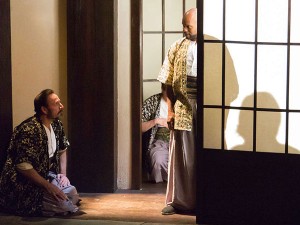
If William Shakespeare were alive today he’d be a …. well, he’d probably be a poet and playwright, but he’d also make a damn good political speechwriter. The crux of his JULIUS CAESAR, now in an accessible production by Lantern Theater Company, comes in a speech following the title character’s assassination.
Marc Anthony’s eulogy could be a template for political persuasion. Beginning with the famous claim that he comes “to bury Caesar, not to praise him,” Anthony (Jered McLenigan) raises the crowd in mutiny against the assassins, all while exclaiming that they are “honorable men.” The assembly that calls Caesar a tyrant when Anthony begins leaves vowing revenge on his killers.
McLenigan nails Anthony’s oration, as he does the “Cry havoc! and slip the dogs of war” speech, but his efforts are let down by U.R.’s rushed preface as Brutus. Affecting an unplaced patrician accent and tone, U.R. fails to communicate the nobility and oratorical skills which Shakespeare ascribes to his character. Properly rendered, the righteous moral cause which Brutus lays out in his own eulogy (“Not that I loved Caesar less, but that I loved Rome more”), amplifies Anthony’s own “power of speech.”

As Caesar, Forrest McClendon evinces convincing gravitas in a pleasing first act. Typical of Lantern Shakespeare shows, director Charles McMahon keeps a fast pace and deftly rotates his small ensemble, though the pacing perhaps skips over the conspirators’ justifications in taking Caesar’s life. The ensemble is handled less adeptly in the warsome second act. McMahon seeks poignancy in the deaths of insufficiently fleshed out minor characters. The Japanese drumming which feels portentous before Caesar’s death only drowns out dialog in the concluding fight scenes.
The music (Christopher Colucci, sound design by Mark Valenzuela) is part of a production style which sees the action relocated from Rome to feudal Japan. (Many of our pre-show predictions are realized: yes there are screen walls, yes the famous assassination takes place partially behind one, yes there are samurai sword fights, no there is no hari kari.)
I don’t know enough about feudal Japan to see the correlations with late Republic Rome, and the production does little to enlighten on this matter. The decision seems solely to affect the scenery (Meghan Jones) and costumes (Brian Strachan). And though the setting is more refreshing than distracting, the changes do not rise above the superficial. In other hands, feudal Japan’s honor code and etiquette might have informed Shakespeare’s play: a brusque Caesar who eschewed the formalistic interactions of his culture might highlight the essential claim of his assassins: that he is rejecting the very foundations of Rome. Shakespeare can be set anywhere (here’s a daring example), but there should be a compelling reason to relocate such an established historical event. Here it only provides pleasant viewing. February 6-March 16, 2014, lanterntheater.org.
Check out two other Julius Caesar reviews by Phindie contributors: Kathryn Osenlund’s review at CurtainUp and Deb Miller’s review at Central Voice.

5 Replies to “JULIUS CAESAR (Lantern): Political persuasion in feudal Japan”